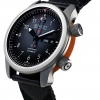Cleaning after pegging jewels
-
Similar Content
-
Recently Browsing
- No registered users viewing this page.
-
Topics
-
Posts
-
Did you watch the whole video? Once Alex has set the stud, he first corrects the best error, then checks that the hairspring coils are breathing concentrically, then turns the stud to centre the hairspring between the open regulator pins. He then checks that the regulator can traverse the terminal curve without disturbing the hairspring. A correction is needed, which he performs. He then reinstalls the balance and re-centres the hairspring between the regulator pins, and verifies that the regulator traverses the terminal curve without disturbing the hairspring. Finally, he demonstrates how to close the gap between pins. He then recaps the whole process, fleshing out more detail. If you follow this process, you have correctly set up the regulator pins, and are ready to set the rate of the watch. If you are interested in learning more about the effects of the regulator pin spacing on positional rates etc, you can read any literature regarding regulator pins. The etachron system makes adjusting beat, centering the hairspring between the regulator pins and adjusting the gap between the pins very convenient, but the same rules that apply to old style regulator pins apply to the etachron system. This video explains the basics : I hope that helps, Mark
-
Some photos of the angles you are talking about, and the changes you are seeing to coil spacing etc. would be really useful. Part of your problem could be that you are closing the pins too far and pinching the hairspring. Adjusting the pin separation should not affect amplitude. Nor should it change the coil separation.
-
Did you try it on a Rolex ref. 16600 specifically? Congrats on the nice condition of the movement in your watch. Even so, remember to check the rotor play or those marks around the main plate may start to build up.
-
Here is a method described in the watch repair book of Mark W. Wiles. Don‘t hammer, just tap very gently!
-
Alex mentions the coils below the stud should remain the same as you move the regulator block along the terminal curve. Mine do that. What he doesn’t discuss and is used in the other video is how the regulator block is used to adjust rate and positional error. He also doesn’t mention how opening and closing the pins could and in my case does, alter amplitude In Alex’s video once he sets the stud he never adjusts the regulator pins yet every new movement I get have the pins signing closed.
-








Recommended Posts
Join the conversation
You can post now and register later. If you have an account, sign in now to post with your account.
Note: Your post will require moderator approval before it will be visible.